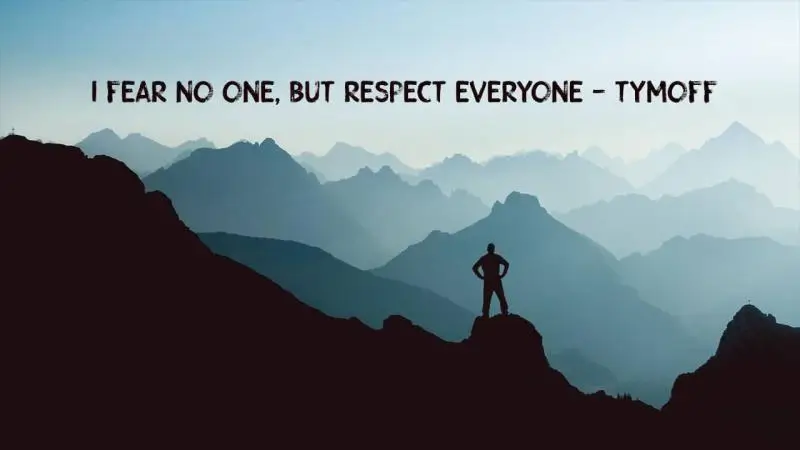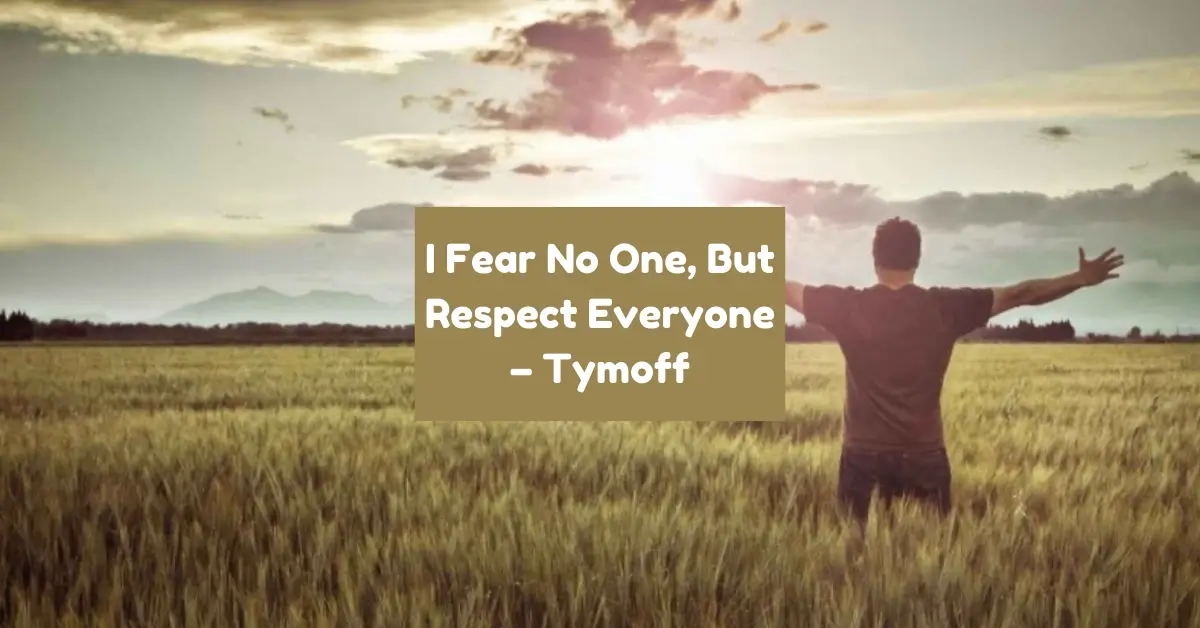The phrase “I fear no one, but respect everyone” from Tymoff encapsulates a profound and empowering mindset that merges fearlessness with deep respect for others. In a world often defined by competition, conflict, and misunderstanding, this philosophy encourages individuals to cultivate confidence while maintaining kindness and humility. Adopting this mindset can lead to personal growth, healthier relationships, and greater success in life.
Fearlessness and respect, when balanced, provide a framework for leading a meaningful life. By learning to face challenges with courage and treating others with dignity, we can create a more inclusive and harmonious environment. Let’s explore the depth of “I Fear No One, But Respect Everyone. – Tymoff” and discover how it can transform our personal and professional lives.
The Philosophy of Fearlessness and Respect
The philosophy of “I fear no one, but respect everyone” is rooted in the idea that confidence and compassion are not mutually exclusive. Fearlessness doesn’t mean recklessness or arrogance; it means having the courage to face life’s challenges head-on, without being held back by fear of failure or rejection. On the other hand, respect involves acknowledging the inherent value of others, regardless of differences in opinion, status, or background.
Respecting others is not a sign of weakness; in fact, it enhances strength. A fearless person who also respects everyone can navigate life with both resilience and empathy. This balance is key to building trust, fostering cooperation, and creating lasting connections, both personally and professionally.
Practical Ways to Embrace Fearlessness and Respect
Adopting the Tymoff philosophy in daily life requires intentional actions. One way to embrace fearlessness is by practicing self-affirmation. Affirmations such as “I am capable,” or “I am worthy,” can reinforce a fearless mindset. These simple phrases help counteract negative self-talk, boosting self-confidence and cultivating inner strength.
At the same time, respecting others involves active listening. Listening carefully to what others are saying, without judgment or interruption, shows that their perspectives are valued. This not only fosters mutual respect but also deepens interpersonal connections. Together, fearlessness and respect create a foundation for more effective communication and stronger relationships.
The Importance of Self-Affirmation in Building Fearlessness
Self-affirmation is a powerful tool for cultivating fearlessness. By consistently reminding ourselves of our capabilities and worth, we can develop a stronger sense of self-confidence. Self-affirmations help to silence self-doubt and empower us to take risks, face challenges, and pursue our goals without fear.
A fearless attitude doesn’t mean ignoring risks or potential failure; it means recognizing these possibilities and moving forward anyway. Building fearlessness through self-affirmation enables individuals to face adversity with resilience and determination, turning potential obstacles into opportunities for growth.
How Active Listening Enhances Respect for Others
Active listening is an essential practice for showing respect in any relationship. It involves fully focusing on the speaker, understanding their perspective, and responding thoughtfully. When we engage in active listening, we demonstrate that we value the speaker’s thoughts and feelings, creating an atmosphere of mutual respect and trust.
By practicing active listening, we can break down barriers in communication and avoid misunderstandings. This skill not only strengthens personal relationships but also enhances professional interactions, making collaboration more effective and meaningful.
Setting Healthy Boundaries as a Fearless and Respectful Practice
Setting healthy boundaries is a crucial aspect of both fearlessness and respect. Fearlessness requires us to assert our needs and protect our emotional and mental well-being. However, doing so respectfully ensures that we don’t infringe on the rights or feelings of others. Boundaries allow us to navigate relationships with integrity and maintain our sense of self-worth.
Respecting others’ boundaries is equally important. When we recognize and honor the limits set by others, we foster a culture of mutual understanding and respect. Boundaries help maintain balance in relationships and prevent conflicts, allowing for healthier and more fulfilling connections.
The Role of Continuous Learning in Respecting Others
Respect is closely linked to continuous learning. Being open to learning from others, regardless of their background or perspective, is a sign of deep respect. Continuous learning involves recognizing that everyone has something valuable to offer and that we can grow by understanding different viewpoints.
This mindset not only enriches our personal lives but also contributes to our professional success. Leaders who embrace continuous learning are more likely to foster inclusive environments where creativity and collaboration thrive. Respecting others’ knowledge and experiences can lead to more innovative solutions and a more compassionate society.
Overcoming Challenges in Adopting Fearlessness and Respect
Embracing a philosophy of fearlessness and respect is not without challenges. Internal doubts and insecurities can hinder fearlessness, making it difficult to take bold steps or assert boundaries. Overcoming these doubts often requires self-reflection, support from others, or professional guidance to build a stronger sense of self.

Externally, conflicts may arise when respecting others while maintaining personal boundaries. However, respectful disagreements can lead to growth. By developing conflict resolution skills, we can navigate disputes in a way that preserves respect for all parties involved, fostering more constructive outcomes.
The Broader Impact of Fearlessness and Respect on Society
The philosophy of fearlessness and respect has far-reaching implications for society. When individuals embrace both, they contribute to more inclusive, compassionate environments. Respect promotes mental well-being, reduces conflicts, and encourages open dialogue, particularly in challenging areas like mental health.
Fearlessness also plays a role in leadership development. Leaders who respect their teams and approach challenges without fear inspire trust and cooperation. These leaders create cultures where innovation and collaboration can flourish, benefiting not only their organizations but society as a whole.
Also Read: Learn to Sit Back and Observe. Not Everything Need – Tymoff
Real-Life Stories of Individuals Embracing Fearlessness and Respect
Real-life examples demonstrate the transformative power of this philosophy. Jane, a high school student, faced bullying for years. By adopting the “I fear no one, but respect everyone” mindset, she found the strength to stand up for herself and others. This shift in attitude not only improved her confidence but also inspired her peers, fostering a more respectful school environment.
Similarly, John, a corporate executive, used this philosophy to guide his leadership style. By respecting his team and not shying away from challenges, he built a workplace culture of trust and innovation. His approach led to both personal fulfillment and professional success, as his employees felt valued and empowered to contribute their best(
Quick Facts
- Originator: Tymoff
- Philosophy: Fearlessness combined with respect for all.
- Core Practices: Self-affirmation, active listening, setting boundaries.
- Impact: Improves personal growth, enhances leadership, fosters inclusive environments.
Final Thoughts
The mindset of “I fear no one, but respect everyone” is a powerful guide for navigating life with both courage and empathy. By embracing fearlessness and respect, we can overcome challenges, build stronger relationships, and contribute to a more compassionate world. Whether in personal or professional life, this philosophy offers a path to success and fulfillment, reminding us that strength lies not in fearlessness alone, but in the respect we show for others.
FAQs
What does the phrase “I fear no one, but respect everyone. -Tymoff” mean?
The phrase “I fear no one, but respect everyone” encourages individuals to be courageous and confident in facing life’s challenges while maintaining respect for everyone, regardless of their background or status.
How can I practice fearlessness in daily life?
Fearlessness can be practiced by using self-affirmations, setting healthy boundaries, and facing challenges with resilience. It’s about embracing risks while maintaining confidence.
Why is respect important in personal growth?
Respect fosters trust, cooperation, and mutual understanding, which are essential for personal growth. When we respect others, we learn from their perspectives, enriching our own lives.
How can I balance fearlessness and humility?
Balancing fearlessness with humility involves being confident in your abilities while recognizing that others have valuable insights. It’s about maintaining self-assurance without becoming arrogant.
Can fearlessness lead to arrogance?
Fearlessness can lead to arrogance if not balanced with respect and humility. It’s important to remain grounded and open to learning from others, ensuring that confidence doesn’t turn into disrespect.










